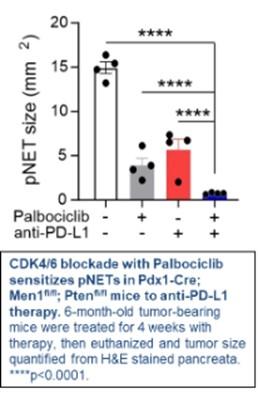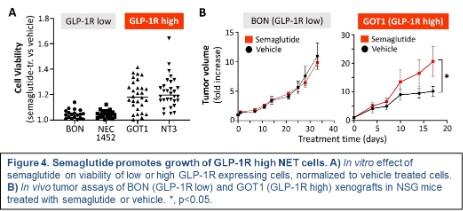University of Iowa Holden Comprehensive Cancer Center
Principal Investigator(s):
Dawn E. Quelle, PhD
Professor, Neuroscience & Pharmacology and Pathology
Leader, Cancer Genes and Pathways Program
Holden Comprehensive Cancer Center
University of Iowa, College of Medicine
2-570 Bowen Science Building
51 Newton Rd
Iowa City, IA 52242
Yusef Menda, MD
Professor of Radiology-Division of Nuclear Medicine
3959 Pappajohn Pavilion
200 Hawkins Drive
Iowa City, IA 52242
(319) 356-3214
James Howe, MD
Professor of Surgery - Surgical Oncology and Endocrine Surgery
3959 Pappajohn Pavilion
200 Hawkins Drive
Iowa City, IA 52242
(319) 356-1727
Overview
The number of persons diagnosed with neuroendocrine tumors (NETs) has risen dramatically in the United States. Iowa NET Specialized Program of Research Excellence (SPORE) researchers are probing novel targeted therapies that deliver a killing blow to tumor cells while sparing normal tissues, investigating the impact of increasingly used diabetes and obesity drugs (incretin mimetics like GLP-1 receptor agonists) on NET growth, and conducting clinical trials to improve patient outcomes. The proposed approaches and therapies should apply to other chemotherapy-resistant and/or immunologically “cold” cancers, such as prostate and breast cancers, as well as tumors that express high levels of receptors for incretin mimetics.
The primary objective of this SPORE is to provide scientific advances that inform more personalized comprehensive care of patients with NET that will improve the length and quality of their lives. This will be achieved through four overarching goals:
1. Support innovative translational research in NETs through three new projects.
2. Provide support to translational investigators through interactive cores.
3. Enlist and encourage new translational researchers in NETs through developmental research and career enhancement programs that successfully transition awardees to independent NET funding.
4. Promote translational research in NETs through horizontal and vertical collaborations that result in innovative treatments and strong evidence-based guidelines for patients with NETs and NECs.
Project 1: Improving immunotherapy in pancreatic NETs
Project Co-Leaders:
Dawn Quelle, PhD (Basic Co-Leader)
Steven K. Libutti, MD (Clinical Co-Leader; Director, Rutgers Cancer Institute)
This novel multi-institutional study addresses the critical need for new therapeutic options for metastatic pancreatic NETs (pNETs) that are potentially curative. The role of B and/or plasma cells in pNET biology is unknown. Still, in other types of tumors, their presence is associated with better patient survival and improved response to immune checkpoint inhibitor (ICI) therapy. This project will determine the importance of B/plasma cell tumor infiltrates in pNET biology and patient outcomes while testing, for the first time, if induction of B/plasma cell tumor infiltration by cyclin-dependent kinase 4/6 (CDK4/6) blockade enhances anti-tumor immunity and efficacy of ICI therapy in pNETs. Findings from novel mouse pNET models and a window of opportunity trial in patients with pNET may define a new strategy to sensitize pNETs to ICI agents, promising sustained anti-tumor activity, extended patient survival, and potential cure.
Project 2: Targeting CXCR4 and Redox Metabolism for Alpha Particle Therapy of Pulmonary Neuroendocrine Tumors and Carcinomas
Project Co-Leaders:
Douglas Spitz, PhD (Basic Co-Leader)
Yusuf Menda, MD (Clinical Co-Leader)
Atypical carcinoids of the lung and lung neuroendocrine carcinomas (NECs) are currently incurable. Most patients succumb to the disease within five years after diagnosis. This project will pursue the development of an exciting new treatment paradigm for these cancers based on high LET alpha radioligand therapy (RLT) with 212Pb Pentixather targeting the CXCR4 receptor combined with cancer cell-specific manipulations of metabolic oxidative stress. The studies will optimize clinical imaging, therapy delivery, and dosimetry techniques and, if successful, will have a lasting impact on improving outcomes for neuroendocrine lung cancer patients.
Project 3: GLP-1R/GIPR agonists in promoting gastroenteropancreatic (GEP) NET progression
Project Co-Leaders:
Po Hien Ear, PhD (Basic Co-Leader)
Joseph Dillon, MD (Clinical Co-Leader)
James Howe, MD (Clinical Co-Leader)
This timely investigation will define the role and impact of increasingly used obesity and diabetes drugs, GLP-1 and GIP receptor agonists, such as Ozempic, on GEPNET growth. Up to 12% of Americans are already taking these drugs (known as incretin mimetics), and that number is only expected to rise. The central hypothesis of this project is that GLP-1R and GIPR agonists selectively promote GEPNET growth depending on the expression levels of their targeted receptors. This project will be the first to 1) determine the predicted risks of incretin mimetic therapy in patients with GEPNETs that express high levels of these receptors, 2) define the biological impact, mechanisms of action, and receptor dependence of these drugs in human and mouse GEPNET models, and 3) test the possibility that current NET-approved therapies could be beneficial in blocking the tumor-promoting effects of these agents. Results should identify which NET patients may be at risk from incretin mimetic therapy, which incretin mimetic may be taken safely, and how unwanted incretin mimetic effects might be ameliorated.
Administrative Core
Core Co-Directors:
Dawn Quelle, PhD
James Howe, MD
Yusuf Menda, MD
The Administrative Core provides the main organizational structure and oversight of all SPORE activities. The overall goal is to support innovative, collaborative, and rigorous research in NETs and oversee the translation of our team’s findings into improved diagnostic and therapeutic options for NET patients.
Biospecimen Core
Core Director:
Andrew Bellizzi, MD
Michael O’Rorke, PhD
The Biospecimen Core provides a coordinated, centralized, and dedicated service for procuring, processing, and annotating high-quality biospecimens from patients in our Iowa NET Registry and SEER Residual and Iowa Virtual Tissue Repositories. The specimens collected and maintained herein constitute the largest and most well-characterized resource of NET and NEC tumor tissue in the United States. This work is fundamental for our investigators and programs to adequately tackle clinically relevant scientific questions relating to these perplexing tumors.
Clinical Core
Core Co-Directors:
Joseph Dillon, MD
Muhammad Furqan, MD
The overarching goal of the Clinical Core is to serve as a bidirectional link between patients with neuroendocrine tumor (NET) or neuroendocrine carcinoma (NEC) and advances in research, diagnosis, treatment, long-term care, and, ultimately, disease prevention. Toward this end, 98% of patients attending the Iowa NET Clinic participate in the IRB-approved NET Registry, which currently includes over 2,400 subjects who can be directly contacted if a clinical trial is being developed for which they may qualify. Additionally, we are leading a multi-institutional collaboration to create a de-identified database that will include over 7,000 subjects, facilitating population science and patient-reported outcomes research.
Developmental Research Program (DRP)
Program Co-Directors:
Yusuf Menda, MD
Dawn Quelle, PhD
Our DRP seeks to bring new ideas and innovative techniques to bear on the diagnosis, curative therapy, and the ultimate prevention of NETs. We anticipate that support of developmental research projects will continue to generate new hypotheses to test in SPORE-sponsored projects or through peer-reviewed external grant support. The long-term goal of the Iowa NET SPORE program is to translate the findings of developmental projects into an improved length and quality of life for patients with neuroendocrine tumors.
Career Enhancement Program (CEP)
Program Co-Directors:
James Howe, MD
Dawn Quelle, PhD
The goal of the CEP is to guide the development of creative translational scientists experienced in multidisciplinary research for future leadership in NET research. Providing ample opportunities for training and career enhancement is a top priority of the University of Iowa NET SPORE and our scientific community. The CEP is critical to our long-term commitment to recruiting bright, energetic new investigators into NET translational cancer research and infusing the field with innovative talent and ideas.




